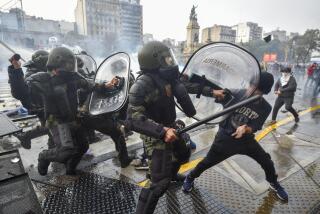Currency Plunges, Inflation Soars as Argentine Election Nears
BUENOS AIRES â Six weeks before Argentinaâs presidential election, the nationâs currency has taken a nose-dive, inflation has surged and the mufa , Argentine slang for angst, pervades the chatter in the capitalâs cafes.
The one sure bet is that the power will be shut off for three hours every day, and youâd better not be in an elevator when it happens.
The austral, Argentinaâs currency, fell sharply against the dollar for three straight days until the spiral finally slowed Thursday, and officials indicated that inflation appears likely to reach 15% for the month of March alone.
When the austral was created in an economic overhaul in June, 1985, replacing the by then almost worthless peso, the new currency bought more than $1. By the close of trading Thursday, $1 bought 49.40 australs, and touched 50 the previous day--more than three times the exchange rate as recently as Feb. 1, when the dollar was worth just over 15 australs.
The resultant inflationary surge means that for the first time since September, when the latest austerity plan took hold, monthly inflation is back in double digits.
The australâs plunge and the jump in inflation are devastating blows to the already slim chances of President Raul Alfonsinâs ruling party, the Radical Civic Union, in the May 14 presidential election. The Peronist candidate, Carlos Saul Menem, already leads all opinion polls, and the talk lately has been of transition policies rather than the race itself.
The Radical candidate, Cordoba province Gov. Eduardo Cesar Angeloz, is running nearly as hard against Alfonsinâs economic policies as he is against Menem, the long-haired populist governor of tiny La Rioja province.
Menem said Thursday that the economy is âin total chaosâ and chided Angeloz for attacking government policies âwhich he supported wholeheartedly until two weeks ago.â Angeloz, in turn, suggested it might be time to throw out some of Alfonsinâs economic planners.
Central Bank President Jose Machinea said the government would raise interest rates, already as high as 283% annually, to hold down the dollar. He blamed general âuncertaintyâ in advance of the election for the rise in the dollar and inflation.
Whoever wins, the election will itself be a milestone in recent Argentine history. For the first time since 1928, an elected president will hand over power to an elected successor, breaking a cycle of alternating military and civilian governments.
The economic crisis and the increasing likelihood of a Peronist victory have prompted speculation about a possible coup dâetat , although most political leaders discount this as a serious threat. The commanders of all three branches of the armed forces this week publicly declared their commitment to democratic rule as a crucial element in restoring political stability and thus allowing economic growth to resume.
Coming so soon after Venezuelaâs social explosion--at least 256 people were killed there last month in rioting over an austerity program based on drastic price increases--Argentinaâs economic problems have caused considerable concern.
Foreign lenders, including the World Bank and the International Monetary Fund, have grown skeptical of Argentinaâs repeated promises to change its ways. The government has fallen about $2.3 billion in arrears in payments on its $59-billion foreign debt, having made just one $100-million interest payment since last April.
The IMF halted fresh lending to Argentina last year, and recently the World Bank suspended two loans worth $350 million, saying Argentina had failed to make the hard fiscal choices needed to right its economy.
Alfonsinâs government has suggested indirectly that it could not impose harsh austerity measures without risking Venezuela-style unrest. Industrialists judge this to be a rationale for avoiding politically costly reforms that could alienate voters just before the election. Critics of the center-left Radical party government blame Alfonsin for lacking the resolve to trim the fiscal deficit, which is running at about 8% of the gross national product.
The government began last August to try to control inflation with financial maneuvers, artificially bolstering the austral by selling off dollar reserves. But by early February the pressures were so great that even the sale of half a billion dollars in reserves could not stop the dollarâs rise, and the government formally abandoned the approach. That unleashed a dollar frenzy and renewed inflation.
Multiple exchange rates help generate income for the government. Exporters are paid at an exchange rate lower than the free-market rate, and the government pockets the difference. The âfinancial dollar,â in which exporters are paid, closed Wednesday at 15.59 australs, less than a third of the free-market rate.
In response, exporters are said to be withholding shipments or juggling invoices to avoid having to accept payment at such an unfavorable rate. In any event, exports are already down, in part because a serious drought has reduced grain harvests, a mainstay of Argentinaâs export economy.
Menem, meanwhile, is capitalizing on the governmentâs miseries, while attempting to assuage conservative Argentinesâ traditional unease with his worker-based party, formed by the late dictator Juan Peron in the 1940s.
A joke making the rounds has a little girl approaching Menem in a cafe and telling him she hopes he wins the election. âWhy do you want me to win?â he asks, and she replies, âBecause my daddy says that if you win, we are going to go live in the United States.â
More to Read
Sign up for Essential California
The most important California stories and recommendations in your inbox every morning.
You may occasionally receive promotional content from the Los Angeles Times.










